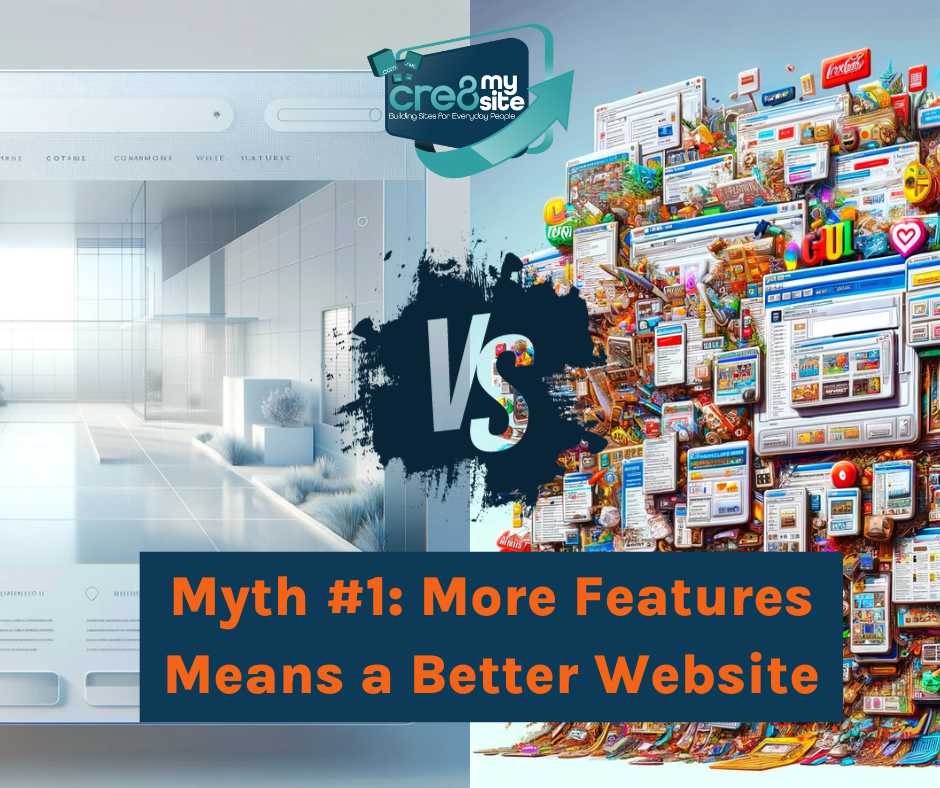Website Myth #1: More Features Means a Better Website
The Art of Web Design: Why Simplicity and Functionality Matter

In today's rapidly evolving digital landscape, your business's website serves as the very first point of contact for potential customers. It functions as a dynamic virtual storefront, not only providing essential information and facilitating transactions but also significantly shaping their initial perception of your brand. However, it's important to recognize that the effectiveness of your website extends far beyond merely incorporating the latest design trends or showcasing flashy features. In fact, overloading your website with excessive features can have detrimental effects, overwhelming visitors and diminishing the overall user experience. In this informative blog post, we will delve into the crucial role of simplicity and functionality in achieving a truly successful web design.
Cognitive Overload
Imagine yourself stepping into a physical store where every shelf is crammed with products, each one clamoring for your attention. The sensation of overwhelm is palpable. This analogy seamlessly extends to the realm of websites. When visitors encounter a website that bombards them with an abundance of features, options, and distractions, the cognitive load they experience can be staggering. This cognitive overload transpires when there is an excessive amount of information to process, making it increasingly challenging for users to focus on their primary objectives, whether it's finding specific information or completing a particular task. The outcome? Pervasive confusion and mounting frustration, which ultimately drive users away.
Reduced Focus
A cluttered website can be a breeding ground for reduced user focus. When a multitude of features and elements jostles for a user's attention, the risk of distraction looms large. Instead of seamlessly engaging with your website's content or effectively completing desired actions, users may find themselves unwittingly lured into clicking on irrelevant links or getting ensnared in the labyrinthine complexity of the design. Consequently, this phenomenon can lead to a noticeable uptick in bounce rates and a corresponding decrease in conversions, significantly undermining your website's overall effectiveness.
Slow Loading Times
Websites laden with numerous features, plugins, and intricate design elements often grapple with the issue of slow loading times. The consequence of slow-loading pages is not to be underestimated; they can be a substantial source of frustration for users, prompting them to abandon the website even before having the opportunity to peruse its content. It's important to recognize that website speed bears immense significance not only for user experience but also for search engine rankings. Excessive clutter within the website's architecture can thus have far-reaching negative consequences in both these crucial domains. Users have come to expect a swift and responsive digital experience, and when these expectations aren't met, they are more likely to seek alternatives on a competitor's site.
Mobile Responsiveness Issues
In today's digital landscape, a significant proportion of web traffic originates from mobile devices. However, websites that are excessively complex may not adapt seamlessly to the smaller screens commonly found on smartphones. This lack of adaptability can result in a suboptimal mobile user experience, as visitors are forced to pinch, zoom, and scroll excessively to access the desired information. Ensuring mobile-friendliness is paramount for reaching a broader audience, and cluttered designs can curtail your website's accessibility, potentially alienating a substantial portion of mobile users.
Decreased Accessibility
An integral aspect of web design is ensuring accessibility for individuals with disabilities. A cluttered website can inadvertently hinder accessibility; an overabundance of features can make it increasingly challenging for screen readers to effectively navigate the site, and the intricate design elements may not be easily navigable via keyboard controls. Ensuring a simple and functional design is crucial for upholding inclusive web accessibility, ultimately allowing all users to seamlessly navigate and interact with your website's content.
Confusing Navigation
The presence of an excessive number of features and options within a website can invariably lead to convoluted navigation menus and complex site structures. Users may find themselves grappling with frustration as they struggle to locate the information or features they're seeking. This, in turn, can lead to diminished user satisfaction and engagement. Therefore, the importance of clear and intuitive navigation cannot be overstated. Simplifying your website's structure and presenting information in a logically organized manner can significantly enhance the user experience by helping users find what they need quickly and efficiently.
Maintenance Challenges
Complex websites boasting a plethora of features often present a slew of maintenance challenges. These challenges can be both resource-intensive and costly. Each additional feature introduces the potential for ongoing support needs, necessitating bug fixes, compatibility checks, and updates. The cumulative effect can strain your available resources and, in some cases, introduce unforeseen technical issues. Conversely, a streamlined website design that places a strong emphasis on functionality can notably reduce the overall maintenance burden, ensuring that your website remains reliable, up-to-date, and efficiently managed.
In Conclusion
In the realm of web design, the timeless adage "less is more" is profoundly applicable. The key to creating an effective website that genuinely resonates with your audience lies in a judicious emphasis on simplicity and functionality. By doing so, you can preemptively mitigate the risk of overwhelming visitors, actively enhancing the user experience, and, ultimately, achieving your website's stated goals. Prioritizing user needs, optimizing for performance, and embracing accessibility are indispensable steps in crafting a website that not only boasts an attractive aesthetic but also functions flawlessly. In this digital era, a clean, user-friendly website serves as a potent tool for cultivating a positive online presence and, by extension, driving the continued success of your business or brand.
Small Businesses Are Our Passion
Build a professional digital presence that your company can be proud of with Cre8 My Site's Fully Managed Plans. They will help create an amazing website for your business with exceptional support. Choose a plan to cover your business needs.
Business Hours
Monday-Friday - 8:00am-5:00pm
Saturday - Appointment Only
Sunday - Closed












